 Caroline Green, who is NIHR ARC South London Post-Doctoral Fellow, reflects on the lives of prominent women figures in the health and social care context in South London. (838 words)
Caroline Green, who is NIHR ARC South London Post-Doctoral Fellow, reflects on the lives of prominent women figures in the health and social care context in South London. (838 words)
International Women’s Day is an annual celebration of the achievements of women and a day to put special emphasis on raising awareness of gender bias and taking action for gender equality. Women contribute significantly to England’s health and adult social care. The adult social care workforce is dominated by women, with 83% of the workforce being female. In 2017, 77% of NHS health workers were women. However, beyond “holding up” England’s health and social care system, women have revolutionized it at many points in time. This blog post looks back at some significant female figures in South London, who have shaped health and social care either directly or indirectly. This list is of course not exhaustive. Countless women with a diversity of backgrounds are driving today’s health and social care provision in South London and have done so for many years. Yet, the stories of the women below offer an indication of the rich female history of health and social care in this part of London:
Florence Nightingale (1820-1910)
Florence Nightingale is widely considered the founder of modern nursing and a social reformer of health and social care. She first gained prominence as a manager and trainer of nurses during the Crimean War, looking after wounded soldiers. In 1860, she established the nursing school at St Thomas’ Hospital in London, the first secular nursing school in the world, and now part of King’s College London. Many say that Nightingale here laid the foundation of professional nursing, with the International Nurses Day celebrated annually on her birthday. Nightingale’s social justice work extended to the abolition of prostitution laws, advocating for hunger relief in India and expanding acceptable forms of female participation in the workforce.
Mary Seacole (1805-1881)
Mary Seacole was a British–Jamaican businesswoman and nurse who set up the “British Hotel” behind the lines during the Crimean War, caring for sick and wounded officers mainly through the use of traditional herbal remedies. Her achievements as a nurse were recognised posthumously through the erection of a statue of her at St Thomas’ Hospital in 2016. Many felt that her work had previously been overshadowed by that of Florence Nightingale.
Eleanor Davies-Colley (1874-1934) and Maud Chadburn (1868-1957)
Eleanor Davies-Colley and Maud Chadburn, both surgeons, were the founders of the South London Hospital for Women and Children (1912-1984), now part of King’s College London. The hospital was the first and only of its kind, comprising all female staff throughout its existence and caring for women only(with the exception of boys under the age of seven).
As part of a wider feminist movement, the two women set up the hospital funded fully by public donations. It was opened by Queen Mary on 4 July 1916. The hospital was not only revolutionary for its exclusively female health and social care workforce but also for the way it provided care to women and children of all backgrounds in society. There were charity wards in which patients paid only what they could afford in addition to private patients who paid a set fee per week. The hospital closed in 1984.
Olive Morris (1952-1979)
Olive Morris was a community and social activist in South London and Manchester. Morris died aged 27 from cancer but left behind a legacy of local activism, which is highly significant for building accessible and equal community-based health and social care systems that reflect on issues of gender and racial bias and discrimination. Morris was the co-founder of the Brixton Black Women’s group and The Organisation of Women of Asian and African Descent, both groups which offered important starting points for the organising of female black activism in South London and beyond.
Dame Cicely Mary Strode Saunders (1918-2005)
Dame Cicely was a nurse, academic, social worker and activist. She is widely recognised as the founder of the modern hospice movement, revolutionizing the way society views and cares for people who are terminally sick, dying and those who are bereaved.
In 1967, Dame Cicely founded St Christopher’s Hospice as the first hospice linking expert pain and symptom control, compassionate care, teaching and clinical research. St Christopher’s has been a pioneer in the field of palliative medicine, which is now established worldwide and is situated in Sydenham, South-east London.
Jane Campbell, Baroness of Surbiton (Born in 1959)
Jane Campbell, Baroness of Surbiton, grew up in New Malden, Surrey and is a leader and campaigner in social care and disability reforms. Over her career, Campbell has held many significant social care posts, including the Chair of the Social Care Institute for Excellence (SCIE), the Commissioner of the Disability Rights Commission, and Commissioner of the Equality and Human Rights Commission (EHRC) from 2006–08. She also served as Chair of the Disability Committee which lead on the EHRC Disability Programme. In 1996 Campbell co-founded and directed the National Centre for Independent Living as part of a wider movement towards independent living for people with disabilities.
Caroline Green is NIHR ARC South London Post-Doctoral Fellow.